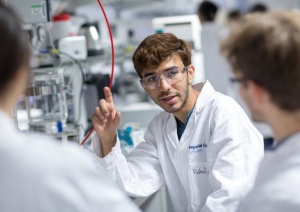Uncertain times call for "patience and reflection", Imperial's President says
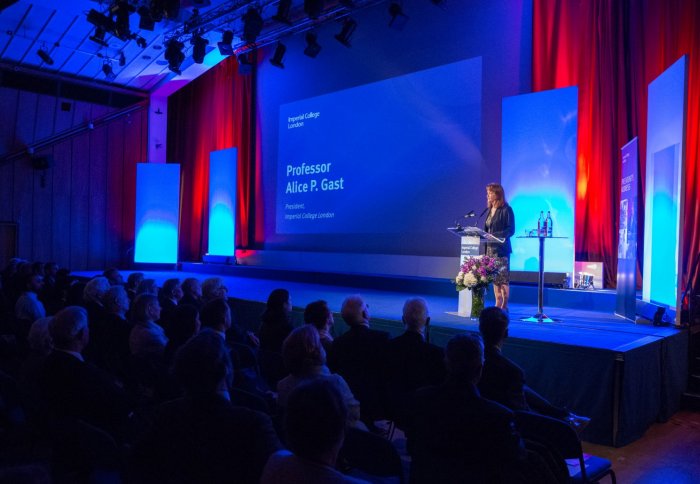
Professor Alice Gast spoke about the importance of patience amid turbulent political change in her third annual address to the Imperial community.
Speaking to an audience of staff, students, alumni and friends, Professor Gast said: “The past year of unexpected political events, and the instability created by uncertainty has made many of us impatient.”
Government should take a proactive, and unilateral, position to welcome Europeans who live here today, to stay
– Professor Alice Gast
President
“There are some things we must be proactive about. We need to know right now that Imperial’s colleagues who are EU citizens will be able to remain in Britain. While to some, this is a negotiating point with Europe, I strongly believe this: government should take a proactive, and unilateral, position to welcome Europeans who live here today, to stay.
“Whenever there is a crisis, an abrupt change or a problem, our natural human desire is to do something, While we all should be trying to do the right thing, to help out and to make our values clear, it seems to me that we also need to try our best to be patient.
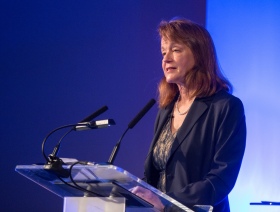 “Just as there is a time for action, so too is there a time for assessment and reflection.”
“Just as there is a time for action, so too is there a time for assessment and reflection.”
Professor Gast spoke of the progress and development of the College’s strategy since its launch in 2015: “The world looks very different now than it did in 2015. Our strategy has evolved because of this, and that is good. But we have a lot yet to do and it is hard to be patient about it.”
During the address, she explored the theme of patience in five priority areas for the College: research, teaching, the translation of discovery, forging enduring partnerships and philanthropy.
Revolutionary research
We should not overlook long-term, fundamental research in our quest for impact, results and answers, Professor Gast said.
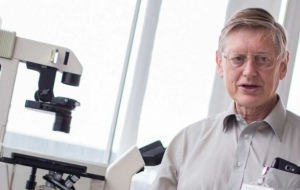
Professor Steve Bloom
She highlighted Professor Steve Bloom’s research into gut hormones and their influence on appetite in the 1980’s, which is still driving revolutionary advances some thirty years after the initial discovery. His research led to appetite reduction therapies through two spinout companies, and he is now working with Professor Chris Toumazou on a microchip to recognise and process signatures of appetite, mimic instructions to the brain, and reduce the urge to eat.
Professor Gast said: “We must make the case for looking to the long term with regard to research and we must not rush forward with research solely driven by short term needs and problems.”
Imperial’s Excellence Fund for Frontier Research, is one way that the College is supporting risky, ground-breaking research, she said.
Teaching innovation
We also need to take a long term view with our approach to teaching, Professor Gast said, and not be unduly distracted by short-term teaching metrics.
The College’s Excellence Fund for Learning and Teaching Innovation is supporting innovative, risky teaching, she said, but educational outcomes are difficult to measure and they take time to see.
The value of a university degree is too often “reduced to a discussion of salary, job placement or a snapshot of student opinion in a survey” she said. “Surveys and salaries are poor proxies for lives well lived and do not fully capture the value of a university education.”
“We must make the case for looking to the long term with regard to education and not rushing forward with teaching metrics solely driven by short term measurements.”
Supporting enterprise
Speaking of translational and entrepreneurial activities, Professor Gast said: “The promise of a new invention gets everyone excited, from the inventor to the investor, to the media. Sometimes that promise is still a long way from certitude and it may take years to come to fruition.”
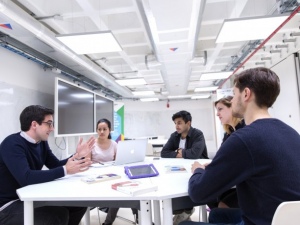
Imperial's Enterprise Lab
We must support those ideas which point to great societal benefit, but little short-term economic impact, Professor Gast said. We should also create an environment that helps small enterprises and entrepreneurs succeed.
“We need appropriate tax incentives for startups, we need appropriate immigration policies for entrepreneurs, and small rapidly growing enterprises, and we need those with a good idea to be able to find space, patient capital and an environment of collegial mentors,” she said
Professor Gast highlighted how the College is doing it’s part to promote innovation among its students, through initiatives like Enterprise Week, the new Enterprise Lab, the Althea-Imperial programme, Venture Catalyst Challenge and Incubator at the I-Hub in White City.
Lasting partnerships
Collaboration is more important than ever as the UK negotioates its changing relationship with Europe, Professor Gast said.
 “We have excellent corporate partners and our relationships with them have persisted and grown through multiple economic cycles and leadership transitions. Our partnerships endure because of the great relationships between our staffs working side-by-side on vexing problems requiring the very best research and the very smartest people.”
“We have excellent corporate partners and our relationships with them have persisted and grown through multiple economic cycles and leadership transitions. Our partnerships endure because of the great relationships between our staffs working side-by-side on vexing problems requiring the very best research and the very smartest people.”
“We know that a partnership is a relationship and it takes time to build true, lasting and sustainable relationships. Patience is required for strong, lasting partnerships”.
Giving back
“Our work would not be possible without the friends, alumni, foundations, staff and parents who provide the financial support for scholarships, chairs, fellowships, laboratories, classrooms, outreach facilities, prizes and lectures. They support us because they understand the importance of our work”, Professor Gast said.
“Philanthropic support requires trust, and the building of trust takes time. Philanthropists do not make donations lightly. It is our responsibility to show the lasting impact of their gifts, not only at Imperial, but across the world.”
Celebrating success
Professor Gast used the occasion to celebrate members of Imperial’s community who received external honours this year, including Professor Tom Kibble’s posthumous recognition with the Institute of Physics Isaac Newton medal, and others receiving Queen’s birthday and new year honours.
Article text (excluding photos or graphics) © Imperial College London.
Photos and graphics subject to third party copyright used with permission or © Imperial College London.
Reporter
Thomas Angus [Photographer]
Communications Division
Deborah Evanson
Communications Division
